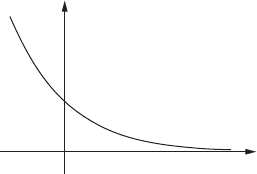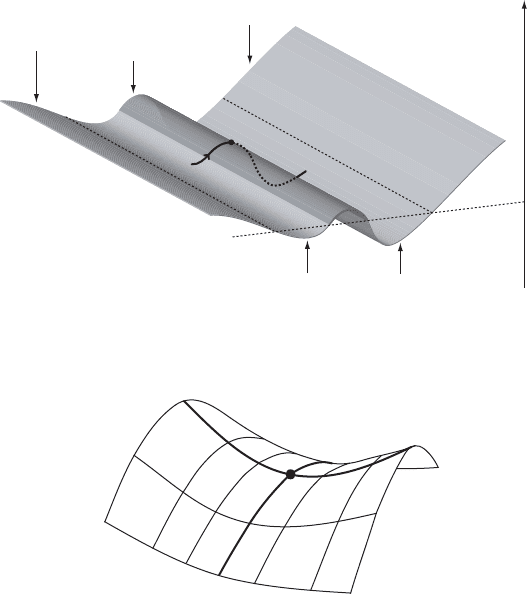Zehnder E. Lectures on Dynamical Systems: Hamiltonian Vector Fields and Symplectic Capacities
Подождите немного. Документ загружается.


VII.3. Minimax principles 271
and kI.e
/kDke
k
E
holds true. Therefore, there exists for every x 2 E a unique
v.x/ 2 E satisfying
df .x/y Dhv.x/;yi for all y 2 E
and kdf .x/k
E
Dkv.x/k, namely v.x/ D I.df .x//. The point v.x/ 2 E is called
the gradient of the function f at the point x with respect to the scalar product h; i
and denoted by v.x/ Drf.x/, so that
df .x/y Dhrf.x/;yi for all y 2 E:
The critical points of the function f are the zeroes of the gradient vector field
x 7!rf.x/
on E and we can interpret the critical points of f dynamically as equilibrium points
of the gradient equation
Px Drf.x/; x 2 E
which is an ordinary differential equation in the Hilbert space E.
In the following we assume that the gradient equation generates a unique global
flow '
t
satisfying
´
d
dt
'
t
.x/ Drf.'
t
.x//; t 2 R;
'
0
.x/ D x; x 2 E;
by requiring that the initial value problem can be uniquely solved for all times and
for all initial conditions x 2 E. Such a global flow does exist, for example, if the
gradient of the function f satisfies a global Lipschitz estimate krf.x/rf.y/k
M kx yk for a constant M and all x; y 2 E, as we have seen in Chapter IV.
From Chapter IV we recall the crucial property of the gradient flow. The function
t 7! f.'
t
.x// decreases along non-constant solutions, in view of
d
ds
f.'
s
.x// D
krf.'
s
.x//k
2
, from which one obtains by integration the identity
f.'
t
.x// D f.x/
Z
t
0
krf.'
s
.x//k
2
ds:
A differentiable function f W E ! R does not need to have critical points,
even if it is bounded below, because the space E is non-compact. The function
f.x/ D e
x
on R satisfies krf.x
j
/k!0 for every sequence x
j
!1, and
the sequence f.x
j
/ is bounded, however the sequence does not have a convergent
subsequence.
We introduce the so-called P.S.-condition, which goes back to R. S. Palais and
S. Smale. It is one of the classical compactness conditions of nonlinear functional
analysis which, in many cases, guarantees critical points.

272 Chapter VII. Symplectic invariants
Definition. A function f 2 C
1
.E; R/ satisfies the P.S.-condition, if every sequence
x
j
2 E satisfying
rf.x
j
/ ! 0 in E and jf.x
j
/jc for all j
possesses a convergent subsequence where c is a constant.
Then, the limit x
of such a subsequence is necessarily a critical point of f ,
rf.x
/ D 0;
because the function f is of class C
1
.
Definition. Let F be a family of subsets F E and f 2 C
1
.E; R/. The minimax
c.f;F/ of the pair .f; F/ is defined as
c.f;F/ ´ inf
F 2F
sup
x2F
f.x/
2 R [ f˙1g:
We shall apply the strategy of the following proposition later on in order to
guarantee a critical point of the action functional.
PropositionVII.17 (Minimax principle). We require that the function f 2C
1
.E; R/
and the family F meet the following conditions.
(i) f satisfies the P.S.-condition.
(ii) Px Drf.x/defines a unique global flow '
t
.x/ on the Hilbert space E.
(iii) The family F is positively invariant under the flow, i.e., for all t 0 we
conclude from F 2 F H) '
t
.F / 2 F:
(iv) The minimax is finite, 1 < c.f; F/<1.
Then the real number c.f; F/ is a critical value of f , i.e., there exists a point x
2 E
satisfying
rf.x
/ D 0 and f.x
/ D c.f; F/:
x
f.x/ D e
x
0
Figure VII.9. The function f.x/ D e
x
on E D R does not have a critical point, even
though rf.x/ ! 0 for x !1.

VII.3. Minimax principles 273
Proof. We abbreviate the minimax by c ´ c.f; F/. It suffices to prove the follow-
ing claim.
Claim. For every ">0there exists a point x 2 E satisfying
c " f.x/ c C " and krf.x/k":
Indeed, if this holds true, the proposition follows, since taking the sequence
"
j
D
1
j
! 0 we obtain a sequence x
j
2 E satisfying
c
1
j
f.x
j
/ c C
1
j
and krf.x
j
/k
1
j
:
Because f satisfies the P.S.-condition, there exists a convergent subsequence of x
j
.
Its limit x
satisfies rf.x
/ D 0 and f.x
/ D c.f;F/, because the functions f
and rf are continuous.
Proof of the claim. In order to prove the claim, we proceed by contradiction and
assume that there exists an ">0satisfying
krf.x/k >" for all x 2fx j c " f.x/ c C "g:
Using the definition of c we find a set F 2 F satisfying sup
x2F
f.x/ c C ".
If x 2 F , then f.x/ c C " and we shall show that
./f.'
t
.x// c " for t
D 2"
1
:
c
c C "
c "
F
F
Figure VII.10. The proof of the minimax principle by contradiction.
This produces the desired contradiction, since for the set F
D '
t
.F / 2 F it
follows that
sup
x2F
f.x/ c ";
274 Chapter VII. Symplectic invariants
which is in contradiction to the definition of the minimax c. It remains to prove the
estimate ./.Iff.'
t
.x// c " for some time t in the interval 0 t t
, then,
indeed, f.'
t
.x// c ", because f.'
t
.x// is decreasing if t increases. If, on
the other hand
./f.'
t
.x// > c " for all 0 t t
;
then it follows from our assumption that krf.'
t
.x//k >"for all 0 t t
.
Using the identity f.'
t
.x// D f.x/
R
t
0
krf.'
s
.x//k
2
ds we obtain the estimate
f.'
t
.x// c C " "
2
t
D c ";
in contradiction to the estimate ./. Thus, the estimate ./ holds true and the
minimax principle is proved.
Example. We assume that the function f on E satisfies the P.S.-condition and that
the corresponding gradient equation generates a unique global flow, as specified
in the assumptions (i) and (ii) of the proposition. In addition, we require that the
function f is bounded below, so that 1 <˛ f.x/for all x 2 E. As a minimax
family F of sets we choose the family of all points, namely F Dfxg
x2E
. Then
˛ c.f; F/ ´ inf
x2E
f.x/ < 1
and therefore c.f; F/ 2 R. Since there is nothing to prove for (iii), we conclude
from the minimax principle the existence of a point x
2 E satisfying
f.x
/ D inf
E
f and rf.x
/ D 0:
We have proved that a global minimum of the function f exists!
As a further illustration we formulate the mountain pass lemma.
Definition. A subset R E is called a mountain range for the function f ,
(i) if the restriction f j
R
is bounded below, so that inf
x2R
f.x/ μ ˛>1,
(ii) if the set E n R has at least two connected components and if in every com-
ponent there exists a point x satisfying f.x/<˛.
PropositionVII.18 (Mountain pass lemma). We assume that a function f W E ! R
is continuously differentiable and satisfies the P.S.-condition and that, moreover,
Px Drf.x/ generates a unique global flow. If R E is a mountain range for
f , then f has a critical value c 2 R satisfying
c inf
R
f:

VII.3. Minimax principles 275
E
0
E
1
E
˛
0
E
˛
1
R
˛
f.x/
Figure VII.11. A mountain range R and the connected components E
0
;E
1
of E n R.
Figure VII.12. Saddle point on a path 2 over the mountain range.
Proof [Minimax principle]. If we choose two different connected components E
0
and E
1
of E nR according to the definition (ii) of a mountain range and if we define
for j D 0; 1 and ˛ D inf
x2R
f.x/the sublevel sets
E
˛
j
Dfx 2 E
j
j f.x/<˛g;
then E
˛
j
¤;. Next, we consider the set of paths connecting the two valleys,
defined by
Df W Œ0; 1 ! E continuous j .0/ 2 E
˛
0
and .1/ 2 E
˛
1
g
and define the family F of subsets of E as
F Df.Œ0; 1/ j 2 g:

276 Chapter VII. Symplectic invariants
The sets .Œ0; 1/ are compact, because the curves are continuous. Since .0/
and .1/ belong to different components of E n R, there exists a parameter value
t
0
2 .0; 1/ satisfying .t
0
/ 2 R, so that
f..t
0
// ˛:
Therefore, ˛ sup
x2.Œ0;1/
f.x/ < 1 for all paths 2 , so that
1 <˛ c.f;F/ D inf
2
sup
x2.Œ0;1/
f.x/ < 1:
Consequently, the minimax is finite. It remains to prove that F is positively invariant
under the flow '
t
of the vector field rf . Due to the monotonicity,
f.'
t
.x// f.'
0
.x// D f.x/; x 2 E; t 0:
Hence, in view of the definition of R, the flow cannot leave the sublevel sets of the
components E nR so that '
t
B 2 for 2 and t 0. Now, we can apply the
minimax principle from which the proposition follows.
Our next task is to extend our action functional ˆ to a continuously differentiable
function defined on a suitable Hilbert space E which contains the set C
1
.S
1
; R/ of
smooth loops as a linear subspace. Moreover, we have to look for a suitable family
F, so that we can perform the minimax strategy.
VII.4 The functional analysis of the action functional
We return to the action functional ˆ W D C
1
.S
1
; R
2n
/ ! R, defined by
ˆ.x/ ´
Z
1
0
1
2
hJ Px.t/; x.t/iH.x.t//dt;
where the smooth function H W R
2n
! R has the properties
(i) H 0 near z D 0 and
(ii) H.z/ D Q.z/ for jzj large.
The quadratic form Q is defined by
Q.z/ D . C "/ q.z/
for a small ">0. We shall extend the function ˆ onto a Hilbert space E and
shall translate the pointwise properties (i) and (ii) of H into the qualitative behavior
of the extended function ˆW E ! R. In order to find a suitable Hilbert space E,
we consider the dominant part of ˆ, namely
a.x; y/ ´
Z
1
0
1
2
hJ Px.t/; y.t/idt:

VII.4. The functional analysis of the action functional 277
We represent the loops x; y 2 C
1
.S
1
; R
2n
/ by their Fourier series
x.t/ D
X
j 2Z
e
j2tJ
x
j
;x
j
2 R
2n
:
Since x belongs to C
1
.S
1
/, its Fourier series does converge not only in L
2
,but
also in the supremum norm and even in every C
k
-norm. Inserting the Fourier series
of the loops x.t/ and y.t/ into a.x; y/, recalling that J
2
D1 and observing that
R
1
0
he
j2tJ
x
j
;e
k2tJ
x
k
idt D ı
jk
hx
j
;x
k
i, one obtains
2a.x; y/ D 2
X
j 2Z
j hx
j
;y
j
i
D 2
X
j>0
jj jhx
j
;y
j
i2
X
j<0
jj jhx
j
;y
j
i:
This representation shows that a.x; y/ can be extended to the Sobolev space
H
1
2
.S
1
; R
2n
/ as a continuous bilinear form.
Definition. The Sobolev space H
s
D H
s
.S
1
; R
2n
/ for a real number s 0 is
defined as
H
s
D
˚
x 2 L
2
.S
1
; R
2n
/ j
P
j 2Znf0g
jj j
2s
jx
j
j
2
< 1
;
where x
j
2 R
2n
denote the coefficientsof the Fourier series x.t/ D
P
j 2Z
e
j2tJ
x
j
which converges in L
2
. The space H
s
is a Hilbert space equipped with the scalar
product
hx; yi
s
´hx
0
;y
0
iC2
X
j 2Znf0g
jj j
2s
hx
j
;y
j
i
and the norm kxk
2
s
Dhx; xi
s
.
The norm kk
0
for s D 0 is equivalent to the L
2
norm, since, according
to the theorem of Plancherel, kxk
2
L
2
D
R
1
0
jx.t/j
2
dt D
P
j 2Z
jx
j
j
2
and hence
kk
L
2
kk
0
p
2 kk
L
2
. In the following the Sobolev space H
1
2
will be the
desired Hilbert space E we shall work on and so we introduce the abbreviations
E ´ H
1
2
.S
1
; R
2n
/;
hx; yi´hx;yi
1
2
;
kxk
2
´hx; xi
1
2
:
There exists an orthogonal splitting of E,
E D E
˚ E
0
˚ E
C
;

278 Chapter VII. Symplectic invariants
into the closed subspaces consisting of the elements x 2 E which have non-
vanishing Fourier coefficients only for j<0, j D 0 or j>0. The corresponding
orthogonal projectors are denoted by P
C
, P
0
and P
. Therefore, every x 2 E
has the unique decomposition
x D x
C x
0
C x
C
2 E
˚ E
0
˚ E
C
where x
C
D P
C
x, x
0
D P
0
x and x
D P
x.
Definition. For x; y 2 E we define the continuous bilinear form a by
a.x; y/ D
1
2
hx
C
;y
C
i
1
2
hx
;y
i
D
1
2
h.P
C
P
/x; yi:
The bilinear form a is an extension of the original bilinear form a defined on
the subspace of smooth loops. Indeed, for two smooth loops x; y 2 E we
have the representation
a.x; y/ D
Z
1
0
1
2
hJ Px; yidt:
Definition. The corresponding quadratic form a W E ! R is defined by
a.x/ D a.x; x/ D
1
2
kx
C
k
2
1
2
kx
k
2
;xD x
C
C x
0
C x
:
The function a W E ! R is continuously differentiable and its derivative da.x/
in the point x 2 E is equal to
da.x/.y/ Dhx
C
;y
C
ihx
;y
i
Dh.P
C
P
/x; yi:
By definition of the gradient, da.x/.y/ Dhra.x/; yi for all y 2 E, so that the
gradient of the function a is equal to
ra.x/ D .P
C
P
/x D x
C
x
2 E:
The map x 7!ra.x/ on E is linear and continuous.
Next, we shall prove some useful properties of the spaces H
s
. First we note
that these spaces decrease according to
H
t
H
s
H
0
for t s 0;
while the norms increase,
kxk
t
kxk
s
kxk
0
; if x 2 H
t
:

VII.4. The functional analysis of the action functional 279
From these estimates one reads off that the inclusion map
I W H
t
! H
s
;t s
is a bounded linear operator and therefore also continuous.
Remark. The loop space D C
1
.S
1
; R
2n
/ is contained in the Sobolev space
H
s
and is dense, for every s 0.
Proof. The Fourier coefficients x
j
2 R
2n
of a smooth loop x 2 satisfy the
following estimates. For every integer k 0 there exists a constant c
k
such that
jx
j
jc
k
1
jj j
k
for all j 2 Z:
Hence kxk
s
< 1 for every s. Since already the subset of consisting of trigono-
metric polynomials x.t/ D
P
N
j DN
e
j2tJ
x
j
with N 2 N and x
j
2 R
2n
is dense
in H
s
for s 0, the claim follows.
Definition. A map between metric spaces is called compact, if it maps bounded sets
onto relatively compact sets, i.e., onto sets whose closure is compact. Equivalently,
the image of a bounded sequence possesses a convergent subsequence.
Since compact sets are bounded, the compact maps map bounded sets onto
bounded sets. In particular, compact linear maps between normed spaces are con-
tinuous maps.
Proposition VII.19. If t>s 0, the inclusion map I W H
t
! H
s
is compact.
Proof. If we define the map P
N
W H
t
! H
s
for the integer N 2 N by
.P
N
x/.t/ ´
X
jj jN
e
j2tJ
x
j
for x.t/ D
X
j 2Z
e
j2tJ
x
j
;
then P
N
2 L.H
t
;H
s
/ is a linear and bounded map. The image under the map P
N
is a finite dimensional space in which relatively compact sets and bounded sets are
the same. Therefore P
N
is a compact map. The set of compact linear operators is
closed with respect to the operator norm, as can be verified easily. The proposition
therefore follows if we show that
P
N
! I in L.H
t
;H
s
/; N !1:

280 Chapter VII. Symplectic invariants
For this purpose we compute
k.P
N
I/xk
2
s
D
X
jj j>N
e
j2tJ
x
j
2
s
D 2
X
jj j>N
jj j
2s
jx
j
j
2
D 2
X
jj j>N
jj j
2.st/
jj j
2t
jx
j
j
2
N
2.st/
2
X
jj j>N
jj j
2t
jx
j
j
2
N
2.st/
kxk
2
t
:
Because t>s,
kP
N
I k
L.H
t
;H
s
/
N
.st/
! 0
as N !1and the proposition is proved.
Not all the elements of the space E D H
1
2
can be represented by continuous
functions. Yet for s>
1
2
the Sobolev space H
s
C.S
1
; R
2n
/ is continuously
embedded in the space of continuous functions equipped with the supremum norm.
Proposition VII.20. If s>
1
2
, then
x 2 H
s
H) x 2 C.S
1
; R
2n
/;
that is, there exists a continuous representative of x 2 H
s
L
2
. Moreover, there
exists a constant c>0such that
sup
t2S
1
jx.t/jckxk
s
for all x 2 H
s
:
Proof. We shall show that the Fourier series
x.t/ D
X
j 2Z
e
j2tJ
x
j
of x 2 H
s
does not only converge in L
2
, but also in the supremum norm, so that
the limit function is, indeed, a continuous function. For s>
1
2
we compute, using
